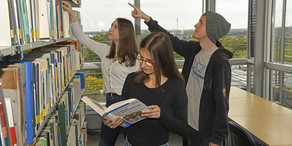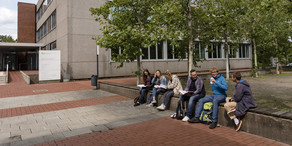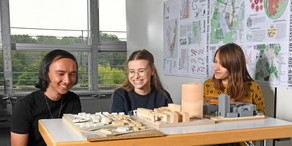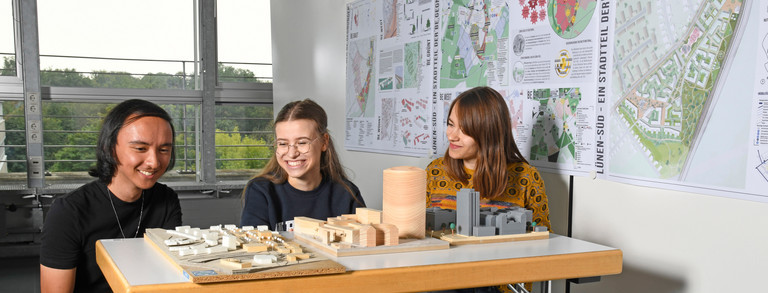Studying at the Department of Spatial Planning
Dear Prospective Students,
fantastic that you are interested in studying spatial planning at the TU Dortmund University. As representatives of the student body, we were also, at one point, in a similar position: coming from very different backgrounds, and ready to select our next courses of study. We found that the Department of Spatial Planning provided fruitful grounds for new insights after high school or instead of another post-secondary option. To date, we find our department still caters to its diverse student body with an equally diverse set of opportunities. We hope to introduce these briefly here.
Spatial planning, unlike other courses of study, encourages diverse group-work possibilities in its orientation towards project and design-studio activities. These are available throughout the entire course of study. Students attend lectures, exercises and seminars as in other disciplines, but they also find themselves working with other peers in group-based practical work. This happens in each year of the studies. First year students are introduced to this through the A-project (beginner project). This continues in the second year through design-studio work and then in the third year through the F-project (advanced project) options. Group work is a core component of the program; through this students learn and develop their abilities to communicate and work in teams that engage a minimum of five or up to 15 participants. The beginners and advanced projects are offered in both German and English languages. These projects deal with practical and relevant issues from different areas of spatial planning. A sampling of topics include but are not limited to traffic, environment, urban planning and other specialty topics related to department research areas.
The modules that make up the study program are just as interdisciplinary. From content on law, social sciences and various engineering sciences, the curriculum will expose you to diverse themes. Not only that, the course-work and deliverables are diverse. Be prepared for written as well as oral examinations as well as various forms of graphical and written assignments.
The length of the bachelor's program is unlike other programs, since students can transition into professional work after not six, but eight semesters. It is worth highlighting that basically every undergraduate is admitted to the master-level program in spatial planning. Also, most students leave the department with a graduate degree.
During your first four semesters as an undergraduate, you will complete a basic study program in which you will learn the fundamentals of spatial planning. Afterwards, you can combine a range of modules as you like to complement the foundational courses. A semester abroad is possible after you complete the design/project work in the 7th or 8th semester. Many students complete this at partner universities. Upon completing your undergraduate studies, you can freely choose a specialization in the master-level program, which is only two semesters long.
Undergraduate students begin the semester with project work involving 13 to 14 other students. A typical week might include lectures, exercises and two project sessions. Even though the afternoon project sessions can sometimes be lengthy, they are especially informative and the positive aspects of collaborative work outweighs any negatives. As deadlines and exam dates approach, stress might become an issue. This doesn't last forever though. Eventually during the lecture-free period that follows, students can decompress or catch up on project tasks. Exam periods bookend deadlines for other assignment. These periods are at the beginning of the lecture-free period or at the beginning of the next semester. Rest assured, however, there is always time for a vacation with friends and fellow students.
Whats more, the study environment is very friendly. Lecturers are approachable and set the tone for a learning atmosphere. There's also no doubt you will connect with peers through the group work or even casually as you catch up with others in the cafeteria about everything else aside from studies.
Finally, students are also represented by an elected student council. As members of this council, we invite you to get involved in our many activities. These include but are not limited to organizing events such as the first semester trip, the Orientation week, game nights, the Christmas party, barbecues, the legendary planners' party and much more. Your engagement is not only a chance to connect with other students, but create and shape your best memories during your studies.
If we haven't convinced you yet, check us out on Instagram (@fachschaft_raumplanung). Our website is also packed with information or you can reach out directly to us via the details on our website if you have questions: www.fsrp.de
We hope you stay well and look forward to seeing you!












